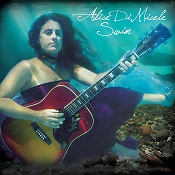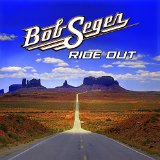 If you still believe in the album format, and Music Riot certainly does, then the sequence of tracks on the album is important and the opening track should set the tone for the rest of the album: it certainly does here. There are no instrumental pyrotechnics on “Soul Fly Free”, no amps cranked to eleven, just a bunch of great musicians laying down a smooth groove overlaid with Hammond and steel guitar that wafts over you like a cool breeze on a still August day. I would normally namecheck most of the musicians, but Alice DiMicele has pretty much used two bands plus a raft of guest musicians to create “Swim”, her thirteenth self-released album so, if you’ll forgive me, I’ll give that a miss this time.
If you still believe in the album format, and Music Riot certainly does, then the sequence of tracks on the album is important and the opening track should set the tone for the rest of the album: it certainly does here. There are no instrumental pyrotechnics on “Soul Fly Free”, no amps cranked to eleven, just a bunch of great musicians laying down a smooth groove overlaid with Hammond and steel guitar that wafts over you like a cool breeze on a still August day. I would normally namecheck most of the musicians, but Alice DiMicele has pretty much used two bands plus a raft of guest musicians to create “Swim”, her thirteenth self-released album so, if you’ll forgive me, I’ll give that a miss this time.
It’s also difficult to pigeonhole Alice; she’s had a couple of attempts herself with ‘organic acoustic groove’ but there are an awful lot of other influences there as well. The album’s closing track “Ripple”, a Grateful Dead cover, is pure country, laid back and with some lovely piano courtesy of the legendary Bill Payne. “When Jane Rides Scout”, dealing with the bond between a woman and her horse, has a trumpet solo which adds a Mexican feel to the song, while “If I Could Move the World” (reworked from the 1994 album, “Naked”) is in a slow jazz styling with muted trumpet which evokes out-of-focus neon lights on a misty night and a vocal which is reminiscent of Rickie Lee Jones.
Alice is renowned as an environmental campaigner and the album features a couple of songs which use human stories as a framework for highlighting environmental concerns. “Old Life Back” sets the controversial practice of fracking (and the ideology backing it up) against the story of a farmer forced to abandon his farm and move to the city. It’s powerful stuff. “School House” combines a narrative about returning to your roots with concerns about the environmental impact of damming the Klamath River in north-western USA. Alice creates a happy ending by looking into a future where the dams have been destroyed and the river is running its natural course again. Vocally, the pathos of “Old Life Back” and the passion of “School House” combine with simple and powerful melodies to create a powerful message.
There are some very personal songs on the album as well. “Inside” deals with the impact of death on those left behind, and the spirit living on in those people, while the uptempo “Open Road” concerns soul mates who are also free spirits and how the apparent contradiction is resolved. “This Love” creates emotion by having Alice sing at the lower end of her range (with a hint of k.d. lang) backed by finger-picked guitar and mellow strings, while “Swim” is unlike anything else on the album. Guitar, bass, Hammond and drums create a swirling, sinuous, funky groove to underpin the vocal, punctuated by stabs and fills from the horn section.
You won’t feel your attention wander while you’re listening to this album; it’s diverse both musically and lyrically. It takes you on an emotional journey for the uplifting “Soul Fly Free” through the harrowing “Inside” to the ebullient and irrepressible “Swim”. It should make you think a little bit along the way as well.
Out on Monday May 4th. Available from CDBaby or iTunes.
 There’s one thing you can say about a Bob Seger album; you know what you’re going to get. What you get is Bob’s gravelly, lived-in voice, a couple of out-and-out rockers, probably a couple of ballads, a couple of mid-tempo anthems, a cover or two (carefully chosen to sound like they could have been written by Bob himself) and maybe something a little bit funky as well. You would expect nostalgic and maybe wistful lyrics about growing up in the Midwest in the sixties, or life on the road and fairly standard rock arrangements spritzed up by a bit of sax and maybe some tasteful Bill Payne piano. So you would expect what is probably his final studio album to be a bit more of the same, and you would be perfectly happy at that.
There’s one thing you can say about a Bob Seger album; you know what you’re going to get. What you get is Bob’s gravelly, lived-in voice, a couple of out-and-out rockers, probably a couple of ballads, a couple of mid-tempo anthems, a cover or two (carefully chosen to sound like they could have been written by Bob himself) and maybe something a little bit funky as well. You would expect nostalgic and maybe wistful lyrics about growing up in the Midwest in the sixties, or life on the road and fairly standard rock arrangements spritzed up by a bit of sax and maybe some tasteful Bill Payne piano. So you would expect what is probably his final studio album to be a bit more of the same, and you would be perfectly happy at that.
Well, “Ride Out” looks like a Bob Seger album and from the opening track, John Hiatt’s “Detroit Made”, it sounds like a Bob Seger album. He’s always been keen on a good rocker to start the proceedings; “Get out of Denver”, “Rock and Roll never Forgets” and “Hollywood Nights” are all opening tracks on “Seven”, Night Moves” and “Stranger in Town” respectively and his romp through Hiatt’s song is right in the comfort zone. “Hey Gipsy” is a straight Chicago blues with guitar and bass playing in unison; it’s a bit of fun but it’s a bit of a departure because, despite the blues influences, you don’t often hear a straight blues on a Bob Seger album.
The cover of Steve Earle’s “The Devil’s Right Hand” is where things start to move out of established Seger territory. It has an Americana/roots feel with some lovely 12-string guitar and Earle’s use of half-line repetitions lends the song a very traditional feel. Bob has had a reputation for solidarity with blue–collar workers in the past but has usually avoided overt political lyrics (certainly during his peak period), so “Ride Out” comes as a surprise with its stabs at the media, high finance and politicians, over a chugging beat punctuated by discordant four-piece horn fills. What comes next is a real surprise; it’s a cover of Australian country stars Shane Nicholson and Kasey Chambers’ “Adam and Eve”; the arrangement is pure dustbowl country with banjo, mandolin, harmonium and fiddle backing Bob and Laura Creamer’s vocal duet. It’s raw, earthy and powerful and the harmonies are superb.
If you’re not already surprised and confused, the next song was written by one of America’s most politicised songwriters; but it’s a Woody Guthrie love song taken from the Wilco/Billy Bragg “Mermaid Avenue” project which was featured on Bob’s 2013 tour. It’s a big production again with violin, Hammond and a horn section and, I know Seger diehards will probably hate this comparison, but it wouldn’t sound out of place on Springsteen’s “We Shall Overcome” album. “”It’s Your World” is another lyrical departure, tackling environmental and financial issues over a sparse piano and guitar-based arrangement; it’s powerful stuff. “All of the Roads” is classic, “Against the Wind”-style Seger, although the violin gives it a more roots feel, creating a nice counterpoint to the Hammond B3. The ballad, “You Take Me In”, a mid-tempo ballad with a fairly traditional Seger arrangement and very upfront vocal would sit perfectly on any Seger album between 1975 and 1995 and sets the scene nicely for a powerful song to close out the album.
And “Gates of Eden” is a powerful song; it’s a slow, almost funereal, revelation of a personal epiphany which builds up with strings, a full rock band and huge backing vocals to a climax before fading out on synth strings. It’s like nothing I’ve ever heard from Bob Seger and it finishes the album as perfectly as a full stop at the end of a sentence. If this is the last album of new Bob Seger material, then “Gates of Eden” is a perfect ending.
The three additional songs on the deluxe edition of the album are all Bob Seger originals. “Listen” and “Let the Rivers Run” are both personal songs, while “The Fireman’s Talkin’” addresses environmental issues again. While I understand the marketing reasons for “Deluxe” editions of albums, in this case it’s an act of vandalism; “Gates of Eden” is clearly intended as a closing song for the album (and perhaps a career) and it’s totally inappropriate to add any songs after that punctuation mark. There’s nothing wrong with the songs, but maybe an additional EP or a download would have worked better.
This is a long way from a comfortable album to keep the fans happy without rocking the boat; this is a set of songs that have the feel of an artist disregarding expectations by using traditional American musical idioms while addressing his concerns about the state of the human race in the twenty-first century before it’s too late. As much as I love Bob Seger’s work, I really wasn’t expecting that; this could be a perfect swansong.
Available on import now.


